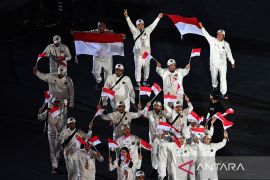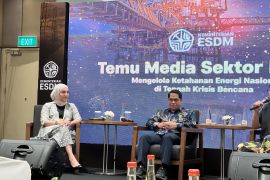By Andi Abdussalam Jakarta - Indonesia, as the world'a largest Muslim country with a population of about 237.6 million, can serve as a world certification center for halal goods in line with the increasing popularity of halal products among both Muslim and non-Muslim consumers. "Indonesia can become (a world center) because we have universities such as the Bogor-based Agriculture Institute (IPB) which have centers for halal (consumable under Islamic law) goods. Indonesia also has many experts in this field," Coordinating Minister for Economic Affairs Hatta Rajasa said over the weekend. According Lukmanul Hakim, Head of the Indonesian Ulema Council (MUI)'s Food, Drug and Cosmetics Research Institute (LPPOM), at least 41 foreign food certification agencies have set their halal food standards based on inputs from the LPPOM. Among the 41 agencies were those of a number of ASEAN member countries, Canada, England, Holland, Belgium, Turkey, Japan and the US, Lukmanul Hakim said recently. "We try to make Indonesian halal certification applicable internationally. Our concept has been submitted to a World Halal Council (WHC) meeting and received a positive response," said Lumanul who is also the WHC's secretary general at a workshop to mark LPPOM-MUI's 22nd anniversary. Thus, Indonesia can become a world certification center for halal products because non-Muslim consumers have also begun to like halal goods, Chief Economic Minister Hatta Rajasa said. At present, 20 percent of the world's food products have been included as halal goods while in the national scale demand for halal goods continues to increase from year to year, from 72 percent in 2009 to 92 percent in 2010. "We have to be serious to transform Indonesia as the world center for halal products, both as center for halal certification and as halal products. The government is providing its support for the MUI and LPPOM," said Hatta. He said that halal certification could also create assurances in the world that halal products had better quality. Hatta who visited a Halal Business and Food Expo said that Indonesia as the world's predominantly Muslim country could serve as the world's halal certification center. "One should not forget that halal goods are liked not only by Muslims but also by non-Muslims," the minister added. Halal labels would help consumers make correct choices of various good quality products such as food, drink and cosmetics and avoid doubted products. "Standards of excellence of halal goods must be in uniform. Standards should not vary which could be questioned by consumers," the minister said. Yet, Lukmanul Hakim expressed concern because the number of goods that had been certified in Indonesia was still small. Certified goods only account for 36.73 percent of the 113,515 registered goods, or only about 41,695 food, medicines and cosmetics products circulating in Indonesia have been certified. Lukmanul Hakim said Indonesia might need to change the voluntary principle to Mandatory one in the process of certifying products in the country. This one of the effort that could be made to increase the number of certified goods with halal labels in the country. After all, he said, the demand for halal goods in the country had increased significantly to 92.2 percent. "So, the figure of goods already certified is still small. The 36.73 percent can become smaller if the 2.5 million household industrial products are taken into account," Lukmanul Hakim. Meanwhile, MUI chairman Ma'ruf Amin said almost all food certification agencies in the world had adopted the practice or seeking LPPOM-MUI's endorsement of the halal status of food or beverage products intended for export to Islamic countries. Ma'ruf said MUI halal standards did not allow the presence of ingredients that were haram (forbidden) in food or beverage products , for example, pig body parts in gelatin, salts and other things, he said. "German institutions did not use the halal concept before, where salt pork is used to be considered as halal to be put in any food. But since they want to be approved by Indonesia, so they follow the standard of halal from MUI," he explained. A number of foreign halal experts had learned about halal food in Indonesia thus showing that LPPOM MUI had gone international, he said. Lukamanul Hakim said Indonesia as a country with a large number of Muslims was a potential market for food and cosmetic products. Therefore, halal certification was needed to protect Muslim consumers. Certification would also strengthen national products in facing the free trade era. Lukmanul said Indonesia was among the first countries in the world that had made a basic halal security system. He said so far Indonesia's halal standards, set by LPPOM MUI, had been acknowledged by 43 foreign institutions in 22 countries, including the US, Australia, New Zealand, Brazil and the Netherlands. In order to promote certified and halal goods, the Cosmetic and Food Research Division of the Indonesian Ulema Council (LPPOM MUI) held a Halal Business and Food Expo here over the weekend. "The exhibition is designed to increase awareness among Indonesian Muslims abo








